不定代词和动词不定式用法小结
初中英语知识点归纳动词不定式的基本用法

初中英语知识点归纳动词不定式的基本用法动词不定式是英语中的一种非谓语动词形式,通常由动词原形加上to 构成。
它具有名词、形容词和副词的性质,可以在句子中充当主语、宾语、表语和补语等成分。
本文将对动词不定式的基本用法进行归纳总结。
一、动词不定式作主语动词不定式作主语时,常常位于句首,具有强调的作用。
常见的句型有:1. To learn English well is my goal.学好英语是我的目标。
2. To drink eight glasses of water a day is beneficial to our health.每天喝八杯水对我们的健康有益。
二、动词不定式作宾语动词不定式可以作及物动词的宾语,常常跟在动词后面。
常见的动词有:1. want, hope, expect, plan, decide, promise, agree 等。
例如:I want to go to the park this weekend.我想这个周末去公园。
2. advise, encourage, allow, enable, force, teach 等。
例如:His teacher encourages him to learn new words every day.他的老师鼓励他每天学习新单词。
三、动词不定式作表语动词不定式可以作表语,说明主语的身份、职业、愿望等。
常见的句型有:1. His dream is to become a doctor.他的梦想是成为一名医生。
2. Our aim is to win the game.我们的目标是赢得比赛。
四、动词不定式作补语动词不定式可以作及物动词的宾语补语和形容词的补足语。
常见的动词有:1. make, let, see, hear, watch, feel, notice, observe 等。
例如:She made her son do his homework.她让她的儿子做作业。
不定代词的用法总结(一)

不定代词的用法总结(一)
不定代词的用法总结
前言
作为一名资深的创作者,我深知不定代词在写作中的重要性。
它
们可以替代特定的名词,使句子更加简洁明了。
在这篇总结文稿中,
我将详细讨论不定代词的用法,希望能为大家提供一些有用的参考。
正文
不定代词主要有以下几种用法:
1.指示未知的事物或人:例如,“有人在门口等你”,
“我听到了一些声音”。
在这种情况下,使用不定代词可以表达
出对特定人或事物的不确定性。
2.泛指一类人或事物:例如,“人人都应该关心环境问
题”,“无论是男是女,都应该平等对待”。
在这种情况下,不
定代词可以代替一类人或事物,使句子更加通用。
3.表示数量或程度:例如,“他们一起吃了许多苹果”,
“我对这件事毫不知情”。
在这种情况下,不定代词可以表示数
量或程度,使句子更加丰富和生动。
4.在否定句中表示全部或部分:例如,“没有人喜欢孤
独”,“什么也不做是不行的”。
在这种情况下,不定代词可以表达出全部或部分的否定。
结尾
通过本文的总结,我们可以看到不定代词在写作中的重要性无可替代。
它们能够使句子更加简洁明了,同时也为我们提供了更多的表达方式。
希望这份总结对大家的写作有所帮助,让我们能够更加流畅地使用不定代词,提升文章的质量。
高中动词不定式的用法总结

高中动词不定式的用法总结动词不定式的用法总结动词不定式由:“to +动词原形”构成,其否定形式是“not to do”。
不定式可以带宾语或状语构成不定式短语,没有人称和数的变化,但有时态和语态的变化。
不定式具有名词特征,可作主语、宾语、状语、表语和定语,但不能单独作谓语。
一.不定式的用法:1.作主语不定式短语作主语时,往往放在谓语动词后,用it 作形式主语。
To see is to believe.It is possible to live an independent and fulfilling life.(P4)2.作宾语不定式短语作宾语时,如果还带有宾语补足语,往往把不定式宾语放在宾语补足语之后,而用it作形式宾语。
常见的带不定式作宾语的动词,begin, continue, hope, decide, want, wish, try, learn, afford, agree, manage, refuse等等。
He wanted to go.I find it interesting to study English.I have learned to adapt to my disability.3.作宾语补足语(ask, tell, order, cause, allow, want, like , advise, force, permit, get等) He asked me to do the work with him.注意:在feel, hear, listen to, look at, notice, observe, see, watch, have, let, make 等词后的补足语中,不定式不带to,但是这些句子如果变成被动结构,就必须带to。
I often hear him sing the song.He is often heard to sing the song.She asked me to go out.4.作定语不定式作定语常放在所修饰的名词或代词的后面。
最全面英语动词不定式的用法归纳整理总结
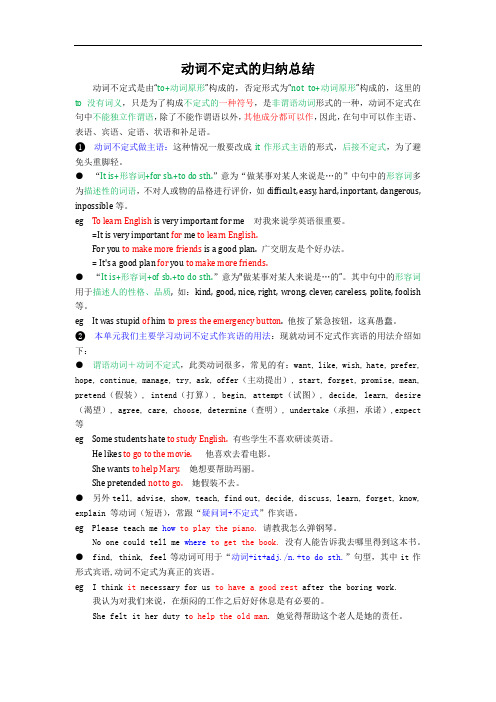
动词不定式的归纳总结动词不定式是由“to+动词原形”构成的,否定形式为“not to+动词原形”构成的,这里的to没有词义,只是为了构成不定式的一种符号,是非谓语动词形式的一种,动词不定式在句中不能独立作谓语,除了不能作谓语以外,其他成分都可以作,因此,在句中可以作主语、表语、宾语、定语、状语和补足语。
❶ 动词不定式做主语:这种情况一般要改成it作形式主语的形式,后接不定式,为了避免头重脚轻。
●“It is+形容词+for sb.+to do sth.”意为“做某事对某人来说是…的”中句中的形容词多为描述性的词语,不对人或物的品格进行评价,如difficult, easy, hard, inportant, dangerous, inpossible等。
eg To learn English is very important for me 对我来说学英语很重要。
=It is very important for me to learn English.For you to make more friends is a good plan. 广交朋友是个好办法。
= It's a good plan for you to make more friends.●“It is+形容词+of sb.+to do sth.”意为"做某事对某人来说是…的”。
其中句中的形容词用于描述人的性格、品质, 如:kind, good, nice, right, wrong, clever, careless, polite, foolish 等。
eg It was stupid of him to press the emergency button. 他按了紧急按钮,这真愚蠢。
❷ 本单元我们主要学习动词不定式作宾语的用法:现就动词不定式作宾语的用法介绍如下:●谓语动词+动词不定式,此类动词很多,常见的有:want, like, wish, hate, prefer, hope, continue, manage, try, ask, offer(主动提出), start, forget, promise, mean, pretend(假装), intend(打算), begin, attempt(试图), decide, learn, desire (渴望), agree, care, choose, determine(查明), undertake(承担,承诺),expect 等eg Some students hate to study English. 有些学生不喜欢研读英语。
初中语文不定代词归纳总结
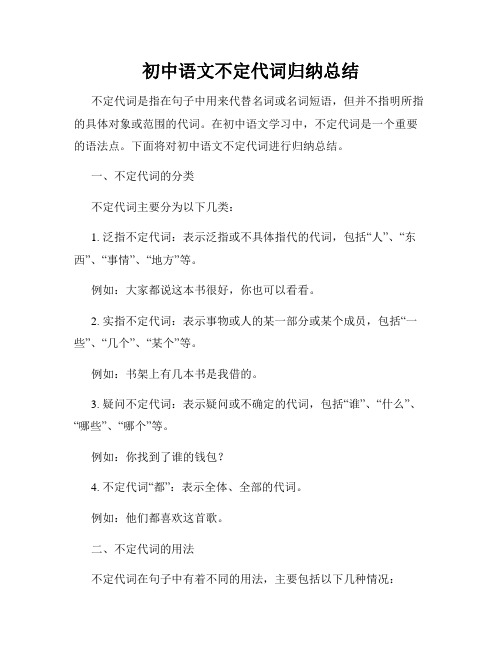
初中语文不定代词归纳总结不定代词是指在句子中用来代替名词或名词短语,但并不指明所指的具体对象或范围的代词。
在初中语文学习中,不定代词是一个重要的语法点。
下面将对初中语文不定代词进行归纳总结。
一、不定代词的分类不定代词主要分为以下几类:1. 泛指不定代词:表示泛指或不具体指代的代词,包括“人”、“东西”、“事情”、“地方”等。
例如:大家都说这本书很好,你也可以看看。
2. 实指不定代词:表示事物或人的某一部分或某个成员,包括“一些”、“几个”、“某个”等。
例如:书架上有几本书是我借的。
3. 疑问不定代词:表示疑问或不确定的代词,包括“谁”、“什么”、“哪些”、“哪个”等。
例如:你找到了谁的钱包?4. 不定代词“都”:表示全体、全部的代词。
例如:他们都喜欢这首歌。
二、不定代词的用法不定代词在句子中有着不同的用法,主要包括以下几种情况:1. 主语或宾语:不定代词可以作为句子的主语或宾语。
例如:有人在门外敲门,快去开门吧。
2. 介词宾语:不定代词可以充当介词的宾语。
例如:我对这件事一无所知。
3. 表示数量:不定代词可以表示数量,包括“多少”、“几个”、“一些”等。
例如:我们买了一些水果。
4. 强调语气:不定代词可以用来加强语气,表示程度上的强调。
例如:你什么都不懂!5. 独立存在:不定代词可以独立存在,构成一个完整的句子。
例如:谁都可以参加这个活动。
三、不定代词的注意事项在使用不定代词时,需要注意以下几点:1. 不定代词在句子中的位置通常是比较灵活的,但需要保持句子的结构和逻辑的连贯性。
2. 不定代词的用法和修饰词、定语、状语等的搭配需要符合语法规则,不能使用不当或造成歧义。
3. 在修辞手法中,不定代词可以用来增加表达的力度和效果,但需要适度使用,避免过度使用。
四、不定代词的练习为了更好地掌握不定代词的用法,可以通过练习来加深理解。
建议在学习过程中积累不定代词的例句,多进行语法分析和语境理解,实践中灵活运用。
初中英语动词不定式的用法小结(外研版英语九年级)
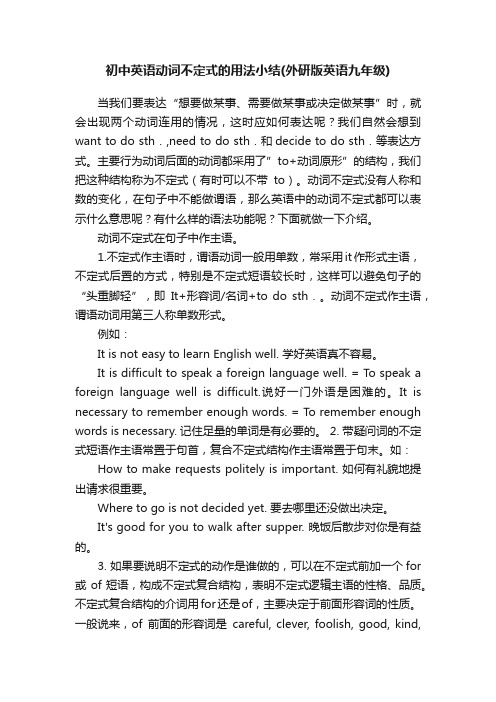
初中英语动词不定式的用法小结(外研版英语九年级)当我们要表达“想要做某事、需要做某事或决定做某事”时,就会出现两个动词连用的情况,这时应如何表达呢?我们自然会想到want to do sth.,need to do sth.和decide to do sth.等表达方式。
主要行为动词后面的动词都采用了”to+动词原形”的结构,我们把这种结构称为不定式(有时可以不带to)。
动词不定式没有人称和数的变化,在句子中不能做谓语,那么英语中的动词不定式都可以表示什么意思呢?有什么样的语法功能呢?下面就做一下介绍。
动词不定式在句子中作主语。
1.不定式作主语时,谓语动词一般用单数,常采用it作形式主语,不定式后置的方式,特别是不定式短语较长时,这样可以避免句子的“头重脚轻”,即It+形容词/名词+to do sth.。
动词不定式作主语,谓语动词用第三人称单数形式。
例如:It is not easy to learn English well. 学好英语真不容易。
It is difficult to speak a foreign language well. = To speak a foreign language well is difficult.说好一门外语是困难的。
It is necessary to remember enough words. = To remember enough words is necessary. 记住足量的单词是有必要的。
2. 带疑问词的不定式短语作主语常置于句首,复合不定式结构作主语常置于句末。
如:How to make requests politely is important. 如何有礼貌地提出请求很重要。
Where to go is not decided yet. 要去哪里还没做出决定。
It's good for you to walk after supper. 晚饭后散步对你是有益的。
不定式知识点归纳总结
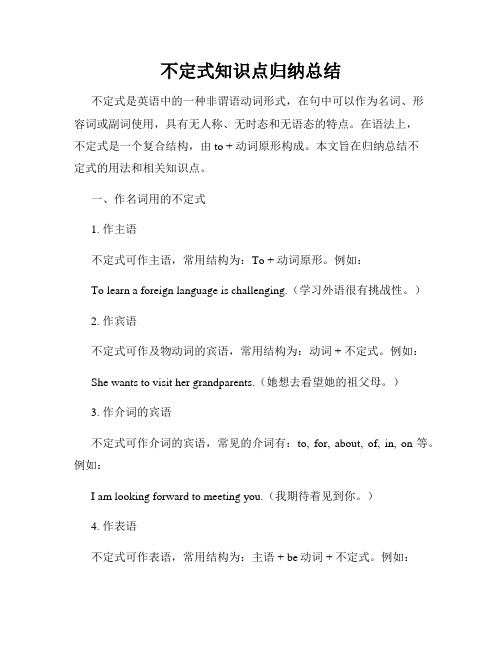
不定式知识点归纳总结不定式是英语中的一种非谓语动词形式,在句中可以作为名词、形容词或副词使用,具有无人称、无时态和无语态的特点。
在语法上,不定式是一个复合结构,由to + 动词原形构成。
本文旨在归纳总结不定式的用法和相关知识点。
一、作名词用的不定式1. 作主语不定式可作主语,常用结构为:To + 动词原形。
例如:To learn a foreign language is challenging.(学习外语很有挑战性。
)2. 作宾语不定式可作及物动词的宾语,常用结构为:动词 + 不定式。
例如:She wants to visit her grandparents.(她想去看望她的祖父母。
)3. 作介词的宾语不定式可作介词的宾语,常见的介词有:to, for, about, of, in, on等。
例如:I am looking forward to meeting you.(我期待着见到你。
)4. 作表语不定式可作表语,常用结构为:主语 + be动词 + 不定式。
例如:Her dream is to become a doctor.(她的梦想是成为一名医生。
)二、作形容词用的不定式1. 修饰名词不定式可用来修饰名词,常见结构为:a(n) + 形容词 + 不定式。
例如:He has a lot of work to do.(他有很多工作要做。
)2. 修饰不定代词不定式可用来修饰不定代词,常见的不定代词有:something, nothing, everything, someone, anyone, no one等。
例如:There is nothing to worry about.(没有什么可担心的。
)三、作副词用的不定式1. 修饰动词不定式可以修饰动词,表示动作发生的目的、结果等。
常见结构为:动词 + 不定式。
例如:He went to the store to buy some groceries.(他去商店买了些食品杂货。
(完整版)动词不定式的用法总结

动词不定式的用法总结动词不定式在中学英语中应用非常广泛,一方面在句中可起名词、形容词或副词的作用,同时也可在句中作主语、宾语、定语、状语和宾语补足语。
接下来为大家提供了以下:动词不定式的用法总结一动词不定式的形式一般是to +动词原形,但to有时要省去。
而动词不定式在具体运用时用不用to,取决于谓语动词的用法。
现就以下几方面介绍如下。
一、不定式结构1. 带to的不定式结构能直接跟带to的不定式结构的动词主要有:want, ask, tell, hope, learn, try, decide, forget, remember, like, love, stop, go, come等。
如:I want to go to the movies with you.我想跟你一起去看电影。
Don’t forget to turn off the light before you leave.在你离开之前别忘了关灯。
注意:动词不定式的否定形式是在不定式前直接加not,即not to do sth.。
如:Dave told me not to wake up Kate.大卫告诉我别叫醒凯特。
2. 不带to的不定式结构以下几种情况使用不带to的动词不定式:(1)在固定词组had better之后。
注意:had better的否定形式是had better not do sth.。
如:You had better go home now.你最好现在回家。
It’s cold outside. You’d better not go out.外面很冷,你最好不要出去。
(2)在let, make, see, feel, watch, hear等感官或使役动词后,要跟不带to的动词不定式作宾语补足语。
如:I made them give me the money back.我迫使他们把钱还给我。
I didn’t see you come in.我没看见你进来。
初三不定代词知识点总结归纳

初三不定代词知识点总结归纳不定代词是英语中一类非常重要的词汇,用于替代特定的名词或名词短语。
在初三阶段的英语学习中,学生需要掌握不定代词的用法和常见的不定代词词汇。
本文将总结归纳初三不定代词的相关知识点,并提供例句进行说明。
一、one的用法不定代词one用来代替前面提到的某一个人或物,表示“一个”或“某一个”。
它可以用作主语、宾语或定语。
下面是一些例句:1. I want a pen. Can you lend me one?(我想要一支笔,你能借给我一支吗?)2. There are many books on the desk. Take one and read it.(桌子上有许多书,请拿一本来阅读。
)3. Have you seen that new movie? I want to watch it, but I don't know which one it is.(你看过那部新电影吗?我想看它,但我不知道是哪一部。
)二、some与any的用法1. some表示肯定意义,通常用于肯定陈述句和肯定疑问句中。
例如:There are some apples on the table. Can I have some sugar?2. any表示否定或疑问意义,通常用于否定陈述句和疑问句中,也可以用于条件句中。
例如:I don't have any money. Is there any milk left? If you have any questions, please let me know.三、no、none和neither的用法1. no表示“没有”的意思,通常用于修饰可数名词或不可数名词。
例如:There is no water in the glass. Yesterday, I received no phone calls.2. none表示“没有一个”的意思,可用作代词或形容词,用于修饰可数名词或不可数名词。
动词不定式的用法总结

动词不定式的用法总结动词不定式是英语中一种常见的非谓语动词形式,由动词原形加上“to”构成。
它具有多种用法和功能,在句子中可以扮演多种角色。
下面将对动词不定式的用法进行总结和分析。
一、作主语动词不定式可以作为句子的主语,通常位于句首,帮助构成句子的基本结构。
例如:- To learn is to grow. - To study is important for success.二、作宾语动词不定式可以作为动词的宾语,跟在及物动词之后。
例如:- She wants to dance all night. - They decided to go on a trip.三、作介词宾语动词不定式还可以作为介词的宾语,通常介词后面要跟动词的-ing形式,但在某些情况下,使用动词不定式更为恰当。
例如:- She is afraid to speak in public. (介词“in”后接动词不定式) - He is capable of solving difficult problems. (介词“of”后接动词不定式)四、作定语动词不定式可以作为名词的定语,修饰名词。
例如:- I have some books to read. - This is a place to visit.五、作表语动词不定式有时也可以作为句子的表语,描述主语的身份或状态。
例如:- His goal is to become a doctor. - The key is to be patient.六、作宾补动词不定式可以作为宾语的补语,表示对宾语的补充说明。
例如:- She considers him to be her best friend. - They found the task to be challenging.七、作状语动词不定式还可以作为状语,修饰动词或整个句子,表示目的、原因、结果等。
例如:- She works hard to achieve her goals. (目的) - He left early to catch the train. (目的) - He stayed up late to finish his project. (目的) - He left the room, only to return a few moments later. (结果)动词不定式的用法多样灵活,在句子中起着重要的作用。
不定代词和不定副词的用法总结(精选五篇)
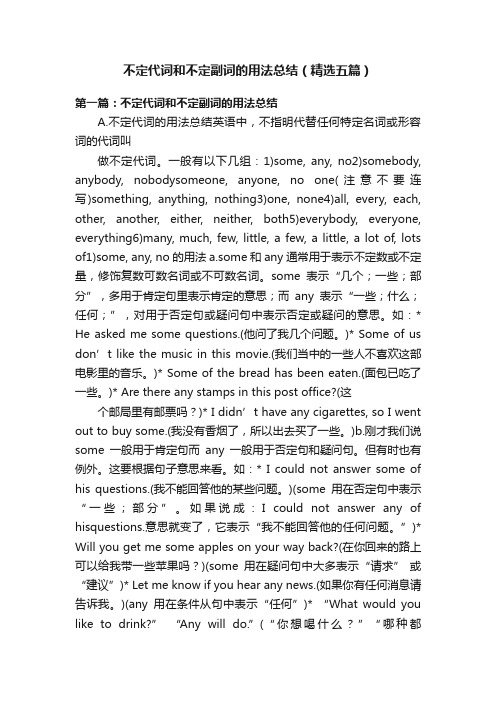
不定代词和不定副词的用法总结(精选五篇)第一篇:不定代词和不定副词的用法总结A.不定代词的用法总结英语中,不指明代替任何特定名词或形容词的代词叫做不定代词。
一般有以下几组:1)some, any, no2)somebody, anybody, nobodysomeone, anyone, no one(注意不要连写)something, anything, nothing3)one, none4)all, every, each, other, another, either, neither, both5)everybody, everyone, everything6)many, much, few, little, a few, a little, a lot of, lots of1)some, any, no的用法a.some和any通常用于表示不定数或不定量,修饰复数可数名词或不可数名词。
some表示“几个;一些;部分”,多用于肯定句里表示肯定的意思;而any表示“一些;什么;任何;”,对用于否定句或疑问句中表示否定或疑问的意思。
如:* He asked me some questions.(他问了我几个问题。
)* Some of us don’t like the music in this movie.(我们当中的一些人不喜欢这部电影里的音乐。
)* Some of the bread has been eaten.(面包已吃了一些。
)* Are there any stamps in this post office?(这个邮局里有邮票吗?)* I didn’t have any cigarettes, so I went out to buy some.(我没有香烟了,所以出去买了一些。
)b.刚才我们说some一般用于肯定句而any一般用于否定句和疑问句。
但有时也有例外。
这要根据句子意思来看。
(完整版)动词不定式用法归纳
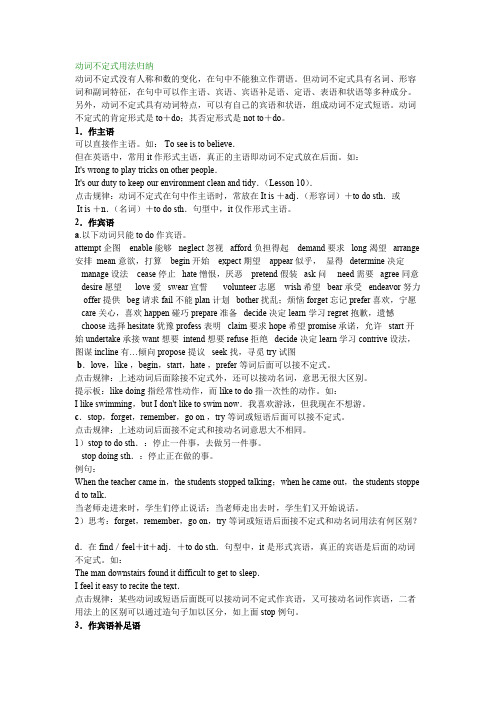
动词不定式用法归纳动词不定式没有人称和数的变化,在句中不能独立作谓语。
但动词不定式具有名词、形容词和副词特征,在句中可以作主语、宾语、宾语补足语、定语、表语和状语等多种成分。
另外,动词不定式具有动词特点,可以有自己的宾语和状语,组成动词不定式短语。
动词不定式的肯定形式是to+do;其否定形式是not to+do。
1.作主语可以直接作主语。
如: To see is to believe.但在英语中,常用it作形式主语,真正的主语即动词不定式放在后面。
如:It's wrong to play tricks on other people.It's our duty to keep our environment clean and tidy.(Lesson 10).点击规律:动词不定式在句中作主语时,常放在It is +adj.(形容词)+to do sth.或It is +n.(名词)+to do sth.句型中,it仅作形式主语。
2.作宾语a.以下动词只能to do 作宾语。
attempt企图 enable能够 neglect忽视 afford负担得起 demand要求 long渴望 arrange 安排 mean意欲,打算 begin开始 expect期望 appear似乎,显得 determine决定manage设法 cease停止 hate憎恨,厌恶 pretend假装 ask问 need需要 agree同意 desire愿望 love爱 swear宣誓 volunteer志愿 wish希望 bear承受 endeavor努力 offer提供 beg请求 fail不能 plan计划 bother扰乱;烦恼 forget忘记 prefer喜欢,宁愿 care关心,喜欢 happen碰巧 prepare准备 decide决定 learn学习 regret抱歉,遗憾choose选择 hesitate犹豫 profess表明 claim要求 hope希望 promise承诺,允许 start开始 undertake承接 want想要 intend想要 refuse拒绝 decide决定 learn学习 contrive设法,图谋 incline有…倾向 propose提议 seek找,寻觅 try试图b.love,like ,begin,start,hate ,prefer等词后面可以接不定式。
不定代词和动词不定式用法小结

不定代词的用法1.代替或修饰不特指的人或事物的代词叫不定代词2.some与any的区别1)some多用于肯定句,表示“一些,几个”,可修饰不可数名词和可数名词的复数形式。
any 多用于疑问句、条件句和否定句中,表示“一些”,可修饰不可数名词和可数名词的复数形式2)在反问句、疑问句中,表示请求、建议和希望对方得到肯定回答时,多用some.Would you like some beer?你要不要来点啤酒吗?Why didn’t you buy some sweets?你怎么没买点糖果?3)any 用于肯定句时,表示是“任何的”Come any day you like.你哪天来都行。
3)some还有表示“某个”的意思I’ll catch up with you some day有一天我会赶上你的。
3.复合不定代词:something(某事), someone(某人), somebody(某人), anything(任何事), anyone(任何人), anybody(任何人), nothing(没事),nobody(没有人), no one(没有人), everything(一切), everyone(每个人), everybody(每个人).A:作主语时,谓语动词用单数。
Is there anything wrong with your watch?”“No, nothing is wrong with itB:修饰复合不定代词的形容词或不定式一定要位于它们的后面。
This is something special. 这是种特别的东西。
Haven’t you got anything to do? 你无事可干吗?C:一般来说,当主语是指人的复合代词,如everybody, nobody, anybody 等时,其反意疑问句后面的主语通常用代词they;当前面句子中的复合代词指物,如everything, something, anything, nothing 等时,其反意疑问句后面的主语通常用代词it。
动词不定式用法小结[1]3概要
![动词不定式用法小结[1]3概要](https://img.taocdn.com/s3/m/888dd8170812a21614791711cc7931b764ce7b43.png)
动词不定式用法小结[1]3概要动词不定式用法小结动词不定式是一种非谓语动词形式,其结构为“to+动词原形”,其中to不是介词,而是动词不定式的符号,称为小品词,动词不定式没有人称和数的变化。
动词不定式和其后面的名词等构成不定式短语,在句子中可以用作主语、表语、宾语、补足语、定语、状语等。
一. 作主语例如:To be a doctor is hard.做医生很难。
To learn English well is not easy.学好英语不容易。
动词不定式(短语)作主语时,为了避免句子的头重脚轻,可以用“it”作形式主语,而把真正的主语--动词不定式(短语)放在句子的后部。
例如上面的句子可以表示为:It is hard to be a doctor.It is not easy to learn English well. 再如:It’s important to plant trees in spring.如果动词不定式的动作是谁做的,可以在动词不定式前面加一个由介词for 引导的短语,称为不定式的复合结构。
例:It’s good for us to read English aloud in the morning.对我们来说每天早晨大声读英语是很有益的。
It is important for students to use English every day.对学生来说每天使用英语是很重要的。
总结:it is +adj for sb to do sth.二. 作表语:动词不定式(短语)作表语常用于系词be的后面。
例:His work is to drive a car.他的工作是开车。
My job is to feed animals.我的工作是饲养动物。
Her ambition is to be a doctor.她的理想是当医生。
三. 作宾语动词不定式(短语)可以放在一些动词后面用作宾语,能以动词不定式作宾语的动词有:begin,start, want, forget, remember, show, learn, like, hate, love, ask 等。
不定代词用法总结3

不定代词用法总结3不定代词用法总结不定代词是指在句中代替不确定的人或物的代词,它们具有代词的特点,可以在句中作主语、宾语、表语等成分。
本文将总结不定代词的用法,以帮助读者更好地理解和运用这一语法知识。
一、不定代词的基本用法1. 人称不定代词:someone, anybody, nobody, everyone等,用来代替不确定的人,常用作主语或宾语。
- 例如:Someone called you while you were out.- 译文:有人给你打电话,你出门时他来了。
2. 物称不定代词:something, anything, nothing, everything等,用来代替不确定的物,也可用作主语或宾语。
- 例如:He didn't say anything about the incident.- 译文:他对那个事情没说什么。
3. 两者不定代词:either, neither, both等,用来表示两者中的一个或两者都不是,常用作主语或宾语。
- 例如:Either of you can come with me.- 译文:你们中的任何一个都可以和我一起去。
二、不定代词在句中的具体用法1. 作主语:- Everyone wants to succeed in life.- 译文:每个人都想在人生中取得成功。
2. 作宾语:- She asked me if I had anything to eat.- 译文:她问我是否有东西吃。
3. 作表语:- The winner could be anyone.- 译文:获胜者可能是任何人。
4. 作定语:- Is there any room available for the night?- 译文:晚上有空房间吗?5. 作状语:- He left without saying anything.- 译文:他走了,什么也没说。
三、不定代词的注意事项1. 每个不定代词都有其固定的语法用法,需要根据具体语境来选择使用,不能随意替换。
动词不定式的用法小结

动词不定式的用法小结动词不定式是英语语法中的一个重要部分,它具有多种用法,灵活多样。
接下来,让我们详细了解一下动词不定式的常见用法。
一、作主语动词不定式作主语时,通常表示具体的、一次性的或将来的动作。
例如:“To learn a foreign language well is not easy”(学好一门外语不容易。
)此时,为了避免句子头重脚轻,常用 it 作形式主语,而将真正的主语动词不定式后置,如:“It is not easy to learn a foreign language well”二、作宾语1、有些动词后只能接动词不定式作宾语,常见的这类动词有:agree(同意),decide(决定),hope(希望),manage(设法),pretend(假装),plan(计划),want(想要),wish(希望)等。
例如:“I decided to go shopping this afternoon”(我决定今天下午去购物。
)2、动词+疑问词+动词不定式。
常见的动词有:know(知道),learn(学习),show(展示),wonder(想知道),understand(理解)等。
例如:“I don't know what to do next”(我不知道接下来做什么。
)三、作宾语补足语1、一些动词如 ask(要求),tell(告诉),want(想要),wish (希望),teach(教),allow(允许)等后面常接带 to 的动词不定式作宾语补足语。
例如:“My mother asks me to clean my room every day”(我妈妈要求我每天打扫房间。
)2、使役动词 let(让),make(使),have(使,让)以及感官动词 see(看见),hear(听见),feel(感觉),watch(观看),notice (注意)等后面接不带 to 的动词不定式作宾语补足语。
不定代词用法总结
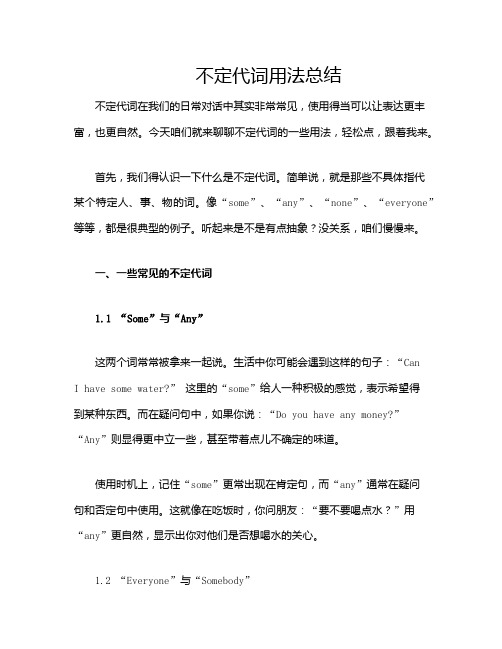
不定代词用法总结不定代词在我们的日常对话中其实非常常见,使用得当可以让表达更丰富,也更自然。
今天咱们就来聊聊不定代词的一些用法,轻松点,跟着我来。
首先,我们得认识一下什么是不定代词。
简单说,就是那些不具体指代某个特定人、事、物的词。
像“some”、“any”、“none”、“everyone”等等,都是很典型的例子。
听起来是不是有点抽象?没关系,咱们慢慢来。
一、一些常见的不定代词1.1 “Some”与“Any”这两个词常常被拿来一起说。
生活中你可能会遇到这样的句子:“Can I have some water?” 这里的“some”给人一种积极的感觉,表示希望得到某种东西。
而在疑问句中,如果你说:“Do you have any money?” “Any”则显得更中立一些,甚至带着点儿不确定的味道。
使用时机上,记住“some”更常出现在肯定句,而“any”通常在疑问句和否定句中使用。
这就像在吃饭时,你问朋友:“要不要喝点水?”用“any”更自然,显示出你对他们是否想喝水的关心。
1.2 “Everyone”与“Somebody”这两个代词同样重要。
“Everyone”意味着所有人,而“somebody”则更模糊。
比如,你可以说:“Everyone loves a good story.” 这是一个普遍的真理。
而“Somebody told me a secret.” 这句则让人感觉更神秘,像是在说一个小道消息。
在社交场合中,如果你想让谈话更加轻松,可以试着用这些代词。
比如:“Somebody once said, life is like a box of chocolates.” 这样的话语瞬间拉近了与听众的距离。
二、否定形式与强调形式2.1 “Nobody”与“Nothing”这些词用起来很方便,特别是在表达否定的时候。
想想看,当你说:“Nobody wants to be alone.” 这就传达了人们普遍的情感。
不定代词与动词的搭配及语法规则
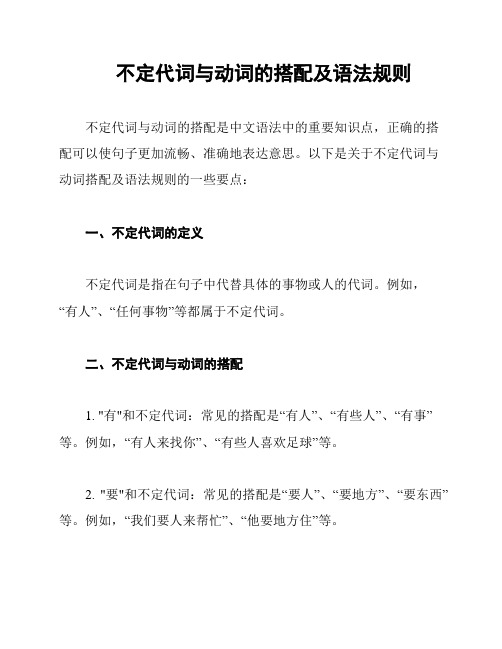
不定代词与动词的搭配及语法规则不定代词与动词的搭配是中文语法中的重要知识点,正确的搭配可以使句子更加流畅、准确地表达意思。
以下是关于不定代词与动词搭配及语法规则的一些要点:一、不定代词的定义不定代词是指在句子中代替具体的事物或人的代词。
例如,“有人”、“任何事物”等都属于不定代词。
二、不定代词与动词的搭配1. "有"和不定代词:常见的搭配是“有人”、“有些人”、“有事”等。
例如,“有人来找你”、“有些人喜欢足球”等。
2. "要"和不定代词:常见的搭配是“要人”、“要地方”、“要东西”等。
例如,“我们要人来帮忙”、“他要地方住”等。
3. "找"和不定代词:常见的搭配是“找人”、“找事”等。
例如,“我要找人谈一谈”、“他喜欢找事情做”等。
4. "买"和不定代词:常见的搭配是“买东西”、“买面包”等。
例如,“我要去买东西”、“他买了很多面包”等。
5. "做"和不定代词:常见的搭配是“做事”、“做人”等。
例如,“我们要专心做事”、“她做人很懂礼貌”等。
三、不定代词的语法规则1. 不定代词作为主语时,动词要用第三人称单数形式。
例如,“有人给我送礼物。
”中的动词“送”用了第三人称单数形式。
2. 不定代词作为宾语时,动词要用不定式形式。
例如,“我要找人帮忙。
”中的动词“找”后面用了不定式形式“帮忙”。
3. 不定代词在句子中一般放在动词之后,形成固定的搭配。
例如,“我们要做事。
”中的不定代词“事”放在动词“做”的后面。
以上是关于不定代词与动词搭配及语法规则的一些要点。
希望对您的学习有所帮助!。
不定式的三种基本用法总结
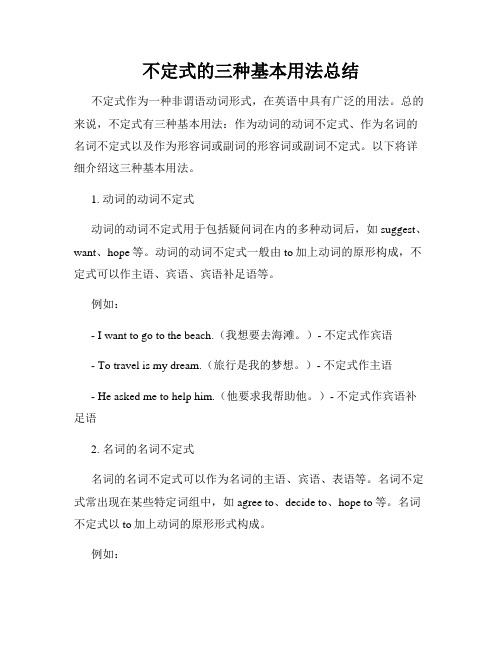
不定式的三种基本用法总结不定式作为一种非谓语动词形式,在英语中具有广泛的用法。
总的来说,不定式有三种基本用法:作为动词的动词不定式、作为名词的名词不定式以及作为形容词或副词的形容词或副词不定式。
以下将详细介绍这三种基本用法。
1. 动词的动词不定式动词的动词不定式用于包括疑问词在内的多种动词后,如suggest、want、hope等。
动词的动词不定式一般由to加上动词的原形构成,不定式可以作主语、宾语、宾语补足语等。
例如:- I want to go to the beach.(我想要去海滩。
)- 不定式作宾语- To travel is my dream.(旅行是我的梦想。
)- 不定式作主语- He asked me to help him.(他要求我帮助他。
)- 不定式作宾语补足语2. 名词的名词不定式名词的名词不定式可以作为名词的主语、宾语、表语等。
名词不定式常出现在某些特定词组中,如agree to、decide to、hope to等。
名词不定式以to加上动词的原形形式构成。
例如:- My goal is to learn a new language.(我的目标是学习一门新语言。
)- 不定式作表语- It is important to finish the project on time.(按时完成这个项目是很重要的。
)- 不定式作表语- I have a desire to travel the world.(我有一个想要环游世界的愿望。
)- 不定式作定语3. 形容词或副词的形容词或副词不定式形容词或副词不定式修饰名词或代词,起到形容词或副词的作用。
形容词或副词不定式通常位于被修饰的名词或代词之后,并以to加上动词的原形构成。
例如:- She is happy to help.(她乐意帮忙。
)- 不定式修饰形容词- It is difficult to understand.(这很难理解。
不定代词用法归纳
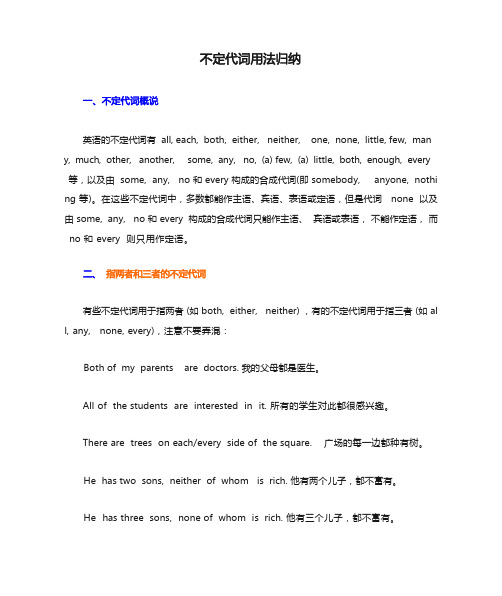
英语的不定代词有 all, each, both, either, neither, one, none, little, few, man y, much, other, another, some, any, no, (a) few, (a) little, both, enough, every 等,以及由 some, any, no 和 every 构成的合成代词(即 somebody, anyone, nothi ng 等)。
在这些不定代词中,多数都能作主语、宾语、表语或定语,但是代词 none 以及由 some, any, no 和 every 构成的合成代词只能作主语、宾语或表语,不能作定语,而no 和 every 则只用作定语。
有些不定代词用于指两者 (如 both, either, neither) ,有的不定代词用于指三者 (如 al l, any, none, every),注意不要弄混:Both of my parents are doctors. 我的父母都是医生。
All of the students are interested in it. 所有的学生对此都很感兴趣。
There are trees on each/every side of the square. 广场的每一边都种有树。
He has two sons, neither of whom is rich. 他有两个儿子,都不富有。
He has three sons, none of whom is rich. 他有三个儿子,都不富有。
each 可用于两者、三者或三者以上,而 every 只用于三者或三者以上,因此用于两者时只能用 each,不能用 every 。
如不能说 There are trees on every side of the road.复合不定代词包括 something, somebody, someone, anything, anybody, any one, nothing, nobody, no one, everything, everybody, everyone 等。
- 1、下载文档前请自行甄别文档内容的完整性,平台不提供额外的编辑、内容补充、找答案等附加服务。
- 2、"仅部分预览"的文档,不可在线预览部分如存在完整性等问题,可反馈申请退款(可完整预览的文档不适用该条件!)。
- 3、如文档侵犯您的权益,请联系客服反馈,我们会尽快为您处理(人工客服工作时间:9:00-18:30)。
不定代词的用法1.代替或修饰不特指的人或事物的代词叫不定代词2.some与any的区别1)some多用于肯定句,表示“一些,几个”,可修饰不可数名词和可数名词的复数形式。
any 多用于疑问句、条件句和否定句中,表示“一些”,可修饰不可数名词和可数名词的复数形式2)在反问句、疑问句中,表示请求、建议和希望对方得到肯定回答时,多用some.Would you like some beer?你要不要来点啤酒吗?Why didn’t you buy some sweets?你怎么没买点糖果?3)any 用于肯定句时,表示是“任何的”Come any day you like.你哪天来都行。
3)some还有表示“某个”的意思I’ll catch up with you some day有一天我会赶上你的。
3.复合不定代词:something(某事), someone(某人), somebody(某人), anything(任何事), anyone(任何人), anybody(任何人), nothing(没事),nobody(没有人), no one(没有人), everything(一切), everyone(每个人), everybody(每个人).A:作主语时,谓语动词用单数。
Is there anything wrong with your watch?”“No, nothing is wrong with itB:修饰复合不定代词的形容词或不定式一定要位于它们的后面。
This is something special. 这是种特别的东西。
Haven’t you got anything to do? 你无事可干吗?C:一般来说,当主语是指人的复合代词,如everybody, nobody, anybody 等时,其反意疑问句后面的主语通常用代词they;当前面句子中的复合代词指物,如everything, something, anything, nothing 等时,其反意疑问句后面的主语通常用代词it。
如:Everyone is here, aren’t they? 人都到了,是吗?Everything is ready, isn’t it? 一切准备好了,是吗?Somebody is waiting for me at the gate, aren’t they? 有人在门口等我,是吗?3.few, a few, little, a little在用法上的区别1)few、little意思是“很少几个”、“几乎没有”,有否定的意思,a few、a little意思是“有几个”、“有些”,有肯定的意思;few、a few修饰可数名词或代替可数的事物, little、a little修饰不可数名词连用或代替不可数的事物。
He is very poor and he has little money. 他很穷,几乎没有什么钱Don’t worry. There is st ill a little time left. 别着急,还有一点儿时间呢In that polar region there live few people. 在那个极地地区几乎不住人You can get a few sweets from him. 你可以从他那儿弄到一些糖果2)a little和little也可以用作副词,a little表示“有点,稍微”,little表示“很少”。
I'm a little hungry.Let him sleep a little.3)quite a few (相当多)only a few (只有几个,几乎没有)4、all和both, either的用法1)all 指三者或三者以上的人或物,用来代替或修饰可数名词或不可数名词。
both指两个人或物,用来代替或修饰可数名词All the food is delicious.所有的食物都很好吃。
Her parents are both doctors.她父母都是医生2)all单独使用时,指代单数,如做主语,谓语动词用单数;指代复数,谓语动词用复数3)采用“all/both + of the +名词”的形式,其中的of 可以省略;如果“all/both + of the +代词”则不可以省略All (of) the boys are naughty.Both of them are studying at the same school4) either::表示“两个中间的任何一个”,做主语,谓语动词用单数,“either...or...”表示或者……或者……在连接并列的名词或代词时,谓语动词与or后面的主语保持一致either作为“也”讲时,要用于否定句中,而too则用于肯定句中。
Either you or I am right.Either of the two boys is clever. 两个男孩都很聪明He doesn't like Beijing opera, I don't like either.5、many和much的用法1)many意思是“很多”,与可数名词复数连用;much意思是“很多”,与不可数名词连用。
I don’t have many friends here .在这里我没有很多的朋友。
Many died in the bus accident. 许多人在公交车祸中丧失2)many和much一般用于否定句,肯定句中通常用a lot of 或者lots of; many / much用于肯定句时可以在前面加上so、very或too.There are a lot of people on the playground. 操场上有许多的人They haven’t got much work to do.他们没有多少事情可做There are too many people in the room. 房间里人太多了6. other,others,the other,the others,anotherother:表示“其他的”,形容词,后面修饰名词的复数形式。
如:Some students are playing basketball, other students are playing tennis..others :表示“其他的”,代词,相当于other +名词,常和some搭配使用。
如: Some students are playing football, others are playing basketball.(others=other students) the other:表示两个人或物中的一个,代词,常与one 连用。
如:There are two apples. One is green, the other is red.the others:表示范围内的另一些(范围总数通常多于两个个),代词There are 40 students in our class, three are American, the others are Chinese. another:表示三者或三者以上的另一个,形容词或代词,后常接名词单数。
如:I have eaten an apple, but I still want another(apple)I have three daughters. One is a nurse, another is a teacher and another is a worker.我有个女儿。
一个是护士,另一个是教师,还有一个是工人。
7. neither, noneneither:A:表示否定,“两者都不”,谓语动词用单数。
B:neither...nor...既不……也不……在连接并列的名词或代词时,谓语动词与nor 后面的主语保持一致。
Neither of his parents helps him 他的父母谁也没帮助他。
Neither the twins nor I am interested Englishnone A:表示三个或三个以上的“都不”,谓语动词可以用单数,也可以用复数。
None of the answers are\is right. 所有的答案都不对。
None of my friends are/is likely to comeB:由How many提问的句子的否定回答中的简略语是None.如:How many books arethere? None.由who提问的句子的否定回答中的简略说法是no one. 如:Who won the game?—No one. 8.one与onesone只能替代单数名词,one的复数形式ones只能替代复数名词。
1. it代替前面提到的同一事物,该事物既可以是可数名词也可以是不可数名词。
The news that they failed their driving test discouraged him, ______?A. did theyB. didn't theyC. did itD. didn't it2. one代替前面提到的同类事物中的一个。
该事物只能是可数名词,前面可以有冠词,也可以被this、that或形容词修饰,其后也可以有定语。
-Why don't we have a little break?-Didn't we just have________?A. itB. thatC. oneD. this3. that代替前面提到的同类事物中特指的一个。
该事物既可以是可数名词也可以是不可数名词,要有后置定语,但不可以有前置修饰语。
Few pleasures can equal ________ of a cool drink on a hot day.A. someB. anyC. thatD. thoseMy child doesn”t like this book.Show her a more interesting one9. every和each用法:A:each可作代词和形容词,而every只能用作形容词。
Every one of us should do housework two hours a day.B:each可指两个或两个以上中间的每一个,而every只可指三个或三个以上中间的每一个。
There are trees on each side of the street.动词不定式用法小结动词不定式是一种非谓语动词形式,其结构为“to+动词原形”,其中to不是介词,而是动词不定式的符号,称为小品词,动词不定式没有人称和数的变化。
